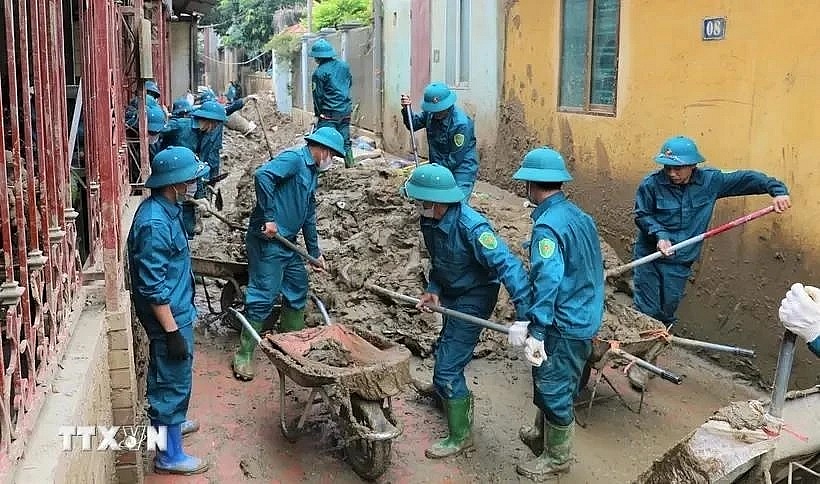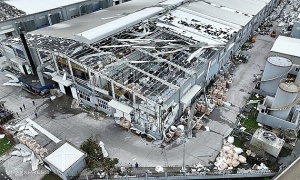Inflation takes focus to circumvent typhoon impact
 |
| Typhoon recovery efforts continue in Yen Bai province. (Photo: VNA) |
Over a week ago, the government emphasised that all resources must be mobilised to meet the highest possible goals for 2024. These include keeping inflation below 4.5 per cent and achieving a GDP growth rate of around 7 per cent.
A resolution on the matter outlined several critical measures to ensure economic stability following Typhoon Yagi, particularly in regions hardest hit by the storm. “It is vital to promote production, secure an adequate supply of goods, avoid shortages, and prevent sudden price increases, especially in areas impacted by natural disasters,” the resolution said.
The government directed ministries, agencies, and local authorities to closely monitor market developments and adjust their approaches to stabilising prices as needed.
“There needs to be greater oversight of price management, taxation, and stabilisation measures concerning essential goods and raw materials,” the resolution continued. “Any speculation, hoarding, or price manipulation will be strictly punished in accordance with the law.”
Authorities are tasked with developing plans for adjusting the prices of state-controlled goods and services, such as electricity, healthcare, and education, to ensure that inflation targets remain within reach.
This renewed focus on inflation control comes after Typhoon Yagi caused havoc in 26 northern provinces, disrupting agricultural production and transport routes, leading to shortages of essential goods such as fresh produce, food, and drinking water. In some areas, these shortages have triggered price increases, making life even more challenging for residents.
Le Trung Hieu, deputy general director of the General Statistics Office (GSO), remains optimistic that the government’s inflation control measures will prove effective, despite the typhoon’s impact on the economy.
“Several factors are putting pressure on prices, such as the aftermath of Typhoon Yagi, wage increases, and rising electricity costs,” Hieu said. “However, the government’s proactive policies are keeping the situation under control, and we expect to meet the year’s inflation target.”
The typhoon caused extensive damage, destroying homes and tearing off corrugated iron rooftops across numerous provinces. Tran Manh Dung, who owns a construction materials store in Hanoi, reported that demand for corrugated iron sheets has soared since the storm hit.
“We’ve seen a five-fold increase in orders for roofing materials compared to typical demand,” Dung said. “Our team has been working day and night to install new roofs for homes and businesses affected by the storm. Despite this surge in demand, the price of corrugated iron sheets has remained steady at just under $7 per square metre. The real challenge is keeping up with demand given the limited workforce available.”
Meanwhile, major supermarkets such as Mega Market Thang Long, Big C, and WinMart+ have not raised prices on essential items such as milk, vegetables, meat, and bottled drinks, despite the increased demand in storm-affected areas. “There haven’t been any price increases on these goods as suppliers have committed to maintaining stable prices to support consumers,” said a saleswoman at Mega Market Thang Long.
According to the GSO, fluctuations in consumer prices were evident in August, with increases in the cost of food, foodstuffs, and rental housing, while domestic fuel prices decreased in line with global oil trends.
“In general, the consumer price index in August remained relatively stable compared to the previous month. The average index for the first eight months of the year rose by 4.04 per cent compared to the same period in 2023,” the GSO reported.
The Ministry of Finance has updated its inflation forecasts based on recent market developments and released three inflation scenarios for 2024, projecting annual rates of 3.72, 4.03, and 4.5 per cent under different conditions.
Meanwhile, the State Bank of Vietnam (SBV) maintained that the inflation target of 4-4.5 per cent remains achievable. However, it also warned that economic pressures are likely to intensify due to both domestic and international factors.
“It is essential for ministries and agencies to continue providing the government with recommendations aimed at minimising negative impacts on prices, ensuring a balance between supply and demand for essential items such as food, electricity, and fuel,” said SBV Deputy Governor Pham Thanh Ha. “The SBV will continue to employ flexible and proactive measures to stabilise the macroeconomic environment and maintain inflation control.”
 | Vietnam’s economy on track for 6.5 per cent growth despite Typhoon Yagi, says HSBC Vietnam's economic recovery remains resilient, with HSBC projecting 6.5 per cent GDP growth for 2024, despite the significant damage caused by Typhoon Yagi, which cost the country an estimated $1.6 billion. |
 | Manufacturing production suffers after Typhoon Yagi Typhoon Yagi had a significant impact on Vietnam's manufacturing sector in September, with heavy rain and flooding causing temporary business closures and delays across production lines and supply chains. |
 | Several banks suspend interest payments for typhoon-affected borrowers Several banks have granted borrowers affected by Typhoon Yagi and its aftermath interest waivers or reductions, as well as support for obtaining new loans. |
What the stars mean:
★ Poor ★ ★ Promising ★★★ Good ★★★★ Very good ★★★★★ Exceptional
 Tag:
Tag:
Related Contents
Latest News
More News
- Tet event in Japan celebrates success of 14th National Party Congress (January 25, 2026 | 10:04)
- 14th National Party Congress wraps up with success (January 25, 2026 | 09:49)
- Congratulations from VFF Central Committee's int’l partners to 14th National Party Congress (January 25, 2026 | 09:46)
- List of newly-elected members of 14th Political Bureau announced (January 23, 2026 | 16:27)
- 14th Party Central Committee unanimously elects To Lam as General Secretary (January 23, 2026 | 16:22)
- List of members of 14th Party Central Committee announced (January 23, 2026 | 09:12)
- Highlights of fourth working day of 14th National Party Congress (January 23, 2026 | 09:06)
- Press provides timely, accurate coverage of 14th National Party Congress (January 22, 2026 | 09:49)
- Press release on second working day of 14th National Party Congress (January 22, 2026 | 09:19)
- Minister sets out key directions to promote intrinsic strength of Vietnamese culture (January 22, 2026 | 09:16)


















 Mobile Version
Mobile Version